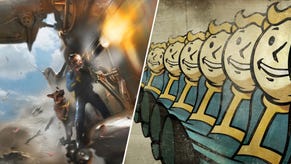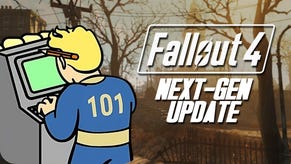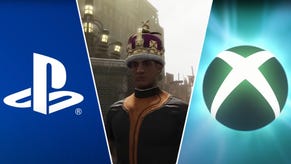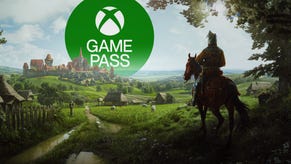Id's Superego: Todd Hollenshead on all things id Software
Another QuakeCon's come and gone, but there are traditions to uphold. Read on for our annual chat with id CEO Todd Hollenshead, wherein we discussed lengthy dev cycles, consoles, the importance of graphics, and tons more.
Todd Hollenshead is a busy man. Whether he's juggling everything short of a flaming chainsaw during QuakeCon, keeping his company from working itself to death as it crunches on RAGE, or making sure the Doom 4 team's exploding collars fit comfortably, he's got a whole damn lot on his plate. And that's just the beginning.
The gaming industry's hit a wild, puberty-like spurt of evolution – only instead of acne and crippling self-esteem issues, gaming's got franchises and even entire companies dropping like flies. Meanwhile, new platforms are springing up, but no one knows quite what to do with them. It's an exciting time to be a gamer. It's a terrifying time to be a game developer.
Hollenshead, though, is hardly quaking in his boots. His company's safe in Zenimax's loving embrace, and – if QuakeCon's any indication – it's got, you know, a few dedicated fans. The future, then, is looking bright. So, what's next? We asked Hollenshead, and he gave us his thoughts on Zenimax, id's plan to shorten its development time, the extended console cycle, the importance of graphics, and tons more.
VG247: Two years ago, we'd have expected this thing to be called BethesdaCon by now. But here we are, and everything's as it always has been. Carmack gave his much-beloved marathon talk, and you're ostensibly using some Harry Potter-level magic device to appear in 80 places at once.
Todd Hollenshead: [Laughs]. I mean, I don't think there's any intention for it to become BethesdaCon. One of the things that we really felt about the acquisition is that it wasn't an “either or” thing. We feel like we make the best shooters in the world, and Bethesda makes the best RPG games in the world.
I think that there's a lot of cross-over interest with our fans. Exhibit A – and maybe the only one I need to make – is the Skyrim presentation from yesterday absolutely [did amazingly]. The fire marshal was like “No more people can come in here.”
Beyond QuakeCon, how are things for id in general? Now that the relationship with Zenimax has solidified, where are you at? Are you planning to work on more games at a time? Or perhaps fewer – but with more focus – because Zenimax has your back in terms of resources?
I think our plan has basically been pretty consistent since the acquisition. You know, focus on RAGE, get that done. We're obviously working on Doom 4. That's not a secret, even though we're not really talking about it. The capital required to put both those games in production – the means and size to do them at a triple-A level – would have been a literal “bet the company” sort of thing. We would have had all kinds of other weird pressures.
One of the things I think it's important for gamers to understand is that there are economic pressures and always have been on id, and there are release schedules and things like that now that we've been acquired. These things don't go away, and it's not like they didn't exist previously. But Zenimax's philosophy is so consistent with ours. It's “the game designers make the games at a higher level, and we get the best marketing and distribution we can.” We integrate these things, so development knows what sales is doing, sales knows what's going on in development. Everybody is working together and rolling in the same direction across all the games that the company's working on.
"We're obviously working on Doom 4. That's not a secret."
And it's one thing to say that stuff, but to see it in practice and know how it really works [is something else entirely]. I mean, RAGE is a better game because of it. Doom 4 will be a better game because of it. And when people were worried about the acquisition, they were afraid there'd be some kind of dilution of how we made games. But – and it's just a “fact”; the proof will come out when the games are released – we're going to make better games as a result of it. Not lesser games.
Speaking of releases, Carmack's Q&A was briefly besieged by Duke Nukem Forever. Carmack, however, mentioned that RAGE isn't all that far behind, tipping the timescales at seven years in development. Going forward, is that a model id hopes to shift away from slightly? I mean, I know “when it's done” is a time-honored tradition, but seven years is a long time...
We're sort of getting a bit of revisionist history, because when John says it, everyone's like “Well, John said it was seven years.” What's John's talking about goes all the way back to when he first started doing the research engine for the game. So the actual development for the game itself [wasn't quite as long]. So I'm not trying to mince words or anything; I just don't want to see headlines everywhere saying, “id worked on RAGE for seven years.” It isn't really true.
It's been seven years since we released Doom 3. But after that, we worked on the Xbox version of it. And after that, we worked on Quake 4 with Raven. And after that, we worked on Enemy Territory: Quake Wars with Splash Damage. So it's not like we've only devoted all that time to RAGE. In addition to all that, we worked on another game that was basically scrapped before we discovered what RAGE is. So there's a lot of time that went into stuff on the development side that wasn't RAGE. So I just want to fact-check that for everybody out there.
But yeah, we need to get to shorter cycles. And I think part of that is that we can't be doing a revolutionary technology with every game we develop. So we have to be able to leverage the technology we make. We have to go to a bit more of an iterative technology approach – as opposed to “OK, now that this game is done, I'm going to throw out every line of code and start from line zero.” We make these huge investments in development pipelines and institutional knowledge and all these things. We've just got to be able to leverage those better and get that time cycle down. I think it's a completely doable thing, but I don't think it just happens without putting some effort into it.
Is the current extended console cycle helpful to you at all in that respect? The tech curve's sort of flattened out for the time being, so there's not quite as much of an impetus to make angels weep at your fence textures and whatnot. Or at least, that's how it seems from the outside looking in.
I think extended console cycles are actually good for everyone. I think they're good for consumers and good for developers. As much as a new console will excite everyone about its technical gee-wizardry, your worst economic period is often the very first year of a new console. Install bases aren't there, you're selling lower units of games, people are having to pay $600-$700 for a console as opposed to $200-$300. And the first games to come out are among the least technically compelling, because there's just such a rush to get stuff out for launch. Those are the reasons in my mind.
"I think extended console cycles are actually good for everyone."
So yeah, it has helped us. But it's not just something that helps us. I think it's something that helps [everyone]. Obviously, Microsoft and Sony are able to make more money if they can extend selling the same thing – or modify it with Kinect or Move or whatever. And I was like “Hmm, that stuff looks like it's going to kind of suck,” but then I hooked up my Kinect – which Microsoft sent me for Christmas last year [laughs] – and I was like “This is pretty cool!” I had to rearrange my living room, but... [laughs]
On a similar note, the number of “mid-generation” technologies has gone through the roof. Like you said, there's Kinect and Move, and I guess Wii U would fit in that category as well...
…And going with giant hard drives. And really focusing on Netflix and services like that.
Exactly. So how much does the graphical arms race even matter anymore? Gaming's become so much broader than that. I mean, let's use Angry Birds as an example. Its graphics would've had trouble making gamers drool 20 years ago, but it's making money hand-over-feathery-fist.
Coming from id – and this is Carmack's quote – graphics will always matter. And I agree with that 100 percent. I think that there's a point where you get diminishing returns, obviously. You approach reality until the point that you get there. And then, once you get there – which, we never will – but the curve gets so close that the differences are imperceptible to most consumers. I don't think we're anywhere near there yet. We're still making graphical trade-offs and working within system constraints. If you gave us twice the horsepower, I guarantee we'd soak up every single bit of it.
So I don't think we're actually getting close to that yet. If every game you could buy was running with every single feature you could have turned on at 120 hertz, then I might say, “It's pretty much all the same.” But it's not. I mean, in RAGE, we decided to run it at 60 hertz and put all our elbow grease behind that when most of our competition is running at 30 hertz. And I think it's a difference-maker.
You, though, are sort of on the forefront of the industry's latest growth spurt. You've got a mega-popular iPhone game, and you were doing free-to-play before it was cool with Quake Live. As the same time, Carmack said Quake Live hasn't exactly been a home run from a business standpoint. And EA had a quote recently about the App Store being “in freefall.” So, how are those types of ventures working out for you on the whole?
The thing for us with Quake Live is that there's one specific thing that can be isolated here. The in-game advertising model hasn't delivered as promised. And I don't think that's specific to Quake Live. It's just that, for Farmville and those types of games embedded into Facebook – which are pretty pervasive about advertising – there's a different model than what we have in Quake Live. You're playing through the game, and we're dynamically delivering ads to you. And that sort of market has not been what people thought it was going to be.
"If you gave us twice the horsepower, I guarantee we'd soak up every single bit of it."
I mean, smarter people than me were making these estimations. Look at Microsoft. They spent, like, $200 million on the Massive acquisition, and they basically shuttered that division in February. So that had ramifications for us, because we used Massive. And if that was more successful, that'd have had a significant impact on what Quake Live is. But you live, you learn, you go forward, you take your lumps, and you figure out “OK, is there another way to do things?”
We changed up stuff with the subscription model, we added ads on the website, we have video advertising – just things like that to bolster up what we've lost. So I still think the jury hasn't come in and given the verdict yet. As long as I've got an opportunity to try and do something with Quake Live – because I love the game – [I'll do it]. The game is an entertainment success, so now we have to figure out how to make the business model work.
Conversely, RAGE was a huge success for you guys on the mobile side. And – though we haven't heard much about it – you've got another mobile RAGE game in development, right? So what are your plans looking like in that space?
Well yeah, that's what John has alluded to, but we haven't sort of officially announced that yet [laughs]. But we always said we wanted to continue to work on that stuff.
But yeah, our strategy on mobile is not to do a whole bunch of social games or whatever. I think there's an avenue for that, but that's not where our skillset is. Our skillset is leveraging our ability to create unbelievable graphics on, like, iOS devices. So no, we don't want to make an Angry Birds. And I'm not saying Angry Birds isn't successful; it just isn't the type of game we make. We want to make something where somebody pulls it up on their iPhone and goes “Look at this! Oh s**t!” Not like “Oh, that's cute.”
Right. But it seems like the market for that kind of stuff hasn't quite caught on with, say, the type of gamers that attend QuakeCon. Some of these people start hissing and fashioning makeshift spears out of busted Xbox controllers at the mere mention of iPad and iPhone gaming. Do you think, though, that it's only a matter of time until they come around – especially with games like yours arguing the case?
Yeah. I mean, honestly, I think that games like Angry Birds and Farmville and stuff like that introduce people to games. They introduce new people to games – people who maybe thought games were just for kids. They try something and think “Oh, this is fun,” and they try something else. Maybe they don't go with one of our titles, but they're still games. You know, honestly, I view these things as bolstering the market – not diluting it.
"If you want to impress your friends, it's not about showing them how much you can score in Angry Birds."
But if you like Angry Birds, maybe Doom: Resurrection or RAGE HD isn't your cup of tea because of the subject matter. But then again, maybe it is. I think if you buy one game on your phone and you like it, you're more likely to buy another. And if you buy a game and you don't like it, you're less likely to buy another – regardless of whether that's RAGE or Angry Birds. But, if you want to impress your friends, it's not about showing them how much you can score in Angry Birds. It's running your iPad 2 with RAGE HD on it.












